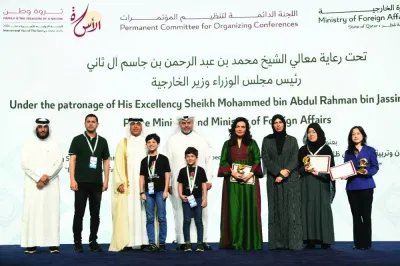The issue of climate change is of great importance and a top priority at the forefront of the international agenda, as it has a very dangerous impact on the planet and the lives of humans, plants and animals, and other variables and risks that are near, medium and far in impact and damage.
From this standpoint, Qatar and the world have realised the importance of this issue, and the need for a sustainable healthy environment as a human right, at a time when global climate negotiations and biodiversity summits have demonstrated global readiness to move in this direction, which the state constantly affirms its strong commitment to contribute to.
The Qatari position in support of international efforts to combat climate change highlights the allocation of the Ministry of Environment and Climate Change, among its competencies, to limit emissions that cause climate change, which confirms the continuous keenness and unlimited support given by His Highness the Amir Sheikh Tamim bin Hamad al-Thani for the issue of the environment and climate.
This keenness is also evidenced by the Amir’s participation in the 26th session of the UN Conference on Climate Change (COP26) in the Scottish city of Glasgow. Within the framework of the meeting that the Amir held with British Prime Minister Boris Johnson on the sidelines of the conference, Qatar Foundation for Education, Science and Community Development (QF) and Rolls-Royce announced that they have entered into a long-term partnership to create a global centre for climate technology innovation.
Qatar’s keenness on the issue of environment and climate change is also evident in the appointment of a Special Envoy of the Minister of Foreign Affairs for Climate Change and Sustainability, and in Qatar’s inclusion of the issue of environment and climate change in its National Vision 2030, which is in line with the UN Sustainable Development Goals (SDGs) and the country’s ambition to reach a leadership position in the region through the implementation of many projects and initiatives that contribute to the efforts made, to reduce air pollutants and carbon dioxide emissions, and increase reliance on renewable energy sources.
In a related context, on Oct 28, Qatar launched its National Environment and Climate Change Strategy, which contributes with the National Climate Change Action Plan 2030 to achieve a balance between the urgent need to work in the field of climate change and environmental protection, and the need to promote social and economic development in a sustainable economy based primarily on the export of liquefied natural gas and related products.
The strategy affirms the state’s commitment to protecting and promoting the environment and establishing harmony between the economic, social and environmental components in line with the objectives of the Qatar National Vision 2030, in addition to the relentless pursuit to secure Qatar’s environment for current and future generations, as well as the unlimited great interest in the phenomenon of climate change as one of the most important environmental issues at the national and global levels, given its risks and challenges that require strengthening the global response and co-ordinating urgent co-operation between the concerned parties.
The strategy covers 5 areas: greenhouse gas emissions, air quality, biodiversity, water, circular economy, waste management and land use, with the development of a governance system to implement the strategy, to reach the specific goals by 2030, including reducing greenhouse gas emissions by 25%, establishing 30 air quality monitoring stations by 2023, and increasing the number of biodiversity reserves.
The strategy is characterised by being integrated in terms of land use, and it aims to improve agricultural productivity and sustainability in line with the Qatar Food Security Strategy, while using land more efficiently will improve the quality of life in Qatar by providing public transport and green spaces.
The strategy also aligns with the sustainable development goals of the United Nations and Qatar’s ambition to reach a leadership position in the region, through the implementation of many projects and initiatives that contribute to efforts to reduce air pollutants and carbon dioxide emissions, and increase reliance on renewable energy sources.
Above all, the strategy is the result of joint efforts between the government, the private sector, civil society and Qatari citizens, aimed at achieving great success and providing a more sustainable future for the Qatari people.
Assistant Undersecretary for Environmental Affairs at the Ministry of Environment and Climate Change engineer Hassan Jumaa al-Mohannadi said in a statement to Qatar News Agency (QNA) that with regard to the first pillar of greenhouse gas emissions, for example, international co-operation will be a key factor in reducing emissions.
He pointed out that to achieve its pledge to reduce greenhouse gas emissions by 25% until 2030 compared to the usual path, the State will adopt low-carbon technologies and solutions based on natural materials, explaining that reducing greenhouse gas emissions will bring many benefits, such as improving the quality of air.
Al-Mohannadi stressed that this strategy constitutes a starting point for the next station of the journey aimed at achieving harmony and balance between the economy, people and nature and also the focal point for unifying and expanding efforts to ensure optimal protection of the ecosystem, and is the cornerstone for managing Qatar’s water resources to achieve sustainability, as well as its contribution to improving waste management practices, which will enable a more circular economy, pointing out that when developing the strategy, great attention was paid to establishing a strong governance structure that would constitute a key enabling factor to ensure the success of its implementation.
He stressed that the effective implementation of this strategy will be a model for other countries to follow to move toward a more sustainable future.
In this context, the state’s efforts go beyond reducing climate change and protecting the habitats and species of different animals, as it is looking forward to the effective use of the land and the optimisation of the available water sources, as well as the effective management of resources and waste in order to achieve a more circular economy.
Qatar has assumed its responsibility as an active partner in the international community to confront climate change.
Qatar spared no effort in the success of the Paris Agreement on climate change negotiations in 2015. By signing the Paris Agreement for climate change, collectively with other world leaders in 2015, Qatar pledged to commit to reducing global temperatures to much less than 2C, and to strive to limit global warming to no more than 1.5C.
At the local level, Qatar has also implemented several environmental projects and initiatives to reduce the impacts of climate change, among them is the One Million Trees Planting Initiative launched in 2019, which has so far completed the planting of more than half a million trees, while the remaining number will be planted before the FIFA World Cup Qatar 2022.
In light of relying largely on the energy sector to drive economic growth and achieve social development, Qatar is keen to find the right balance between providing clean energy and making it available at an affordable cost to all, while at the same time committing to being responsible towards the environment and promoting the preservation of natural resources constantly.
Qatar Energy (QE) plans to reduce the carbon intensity of LNG facilities by 25% by 2030, to reach net zero emissions from routine ignition in natural gas production, as well as set a methane intensity target of 0.2%.
As the host of the 2022 FIFA World Cup, Qatar has affirmed on more than one occasion and forum its commitment to organising an environmentally-friendly tournament and the first carbon-neutrality tournament through the use of solar energy in stadiums, and the use of energy- and water-saving cooling and lighting technology.
Qatar, under the directives of the wise leadership, seeks to occupy high ranks in the public transport sector and the use of environmentally friendly cars.
In this regard, one of the ambitious plans of the Ministry of Transport is that, before the start of the FIFA World Cup Qatar 2022, 20-25% of public transport in the country will be environment-friendly, will use clean energy and enjoy the best safety standards and a high degree of quality and efficiency.
Environmentally-friendly transport options will reduce the carbon footprint of the tournament and build a sustainable legacy for future generations as the provision of clean energy-powered transport solutions such as the Doha Metro, Tram network, and energy-efficient buses will reduce emissions from tournament operations while the proximity of the distances in the Qatar World Cup ensures that fans, players, administrators and others do not need to fly within Qatar, which reduces the environmental impact of the tournament compared to previous editions of the World Cup.

Environmentally-friendly transport options will reduce the carbon footprint of the FIFA World Cup Qatar 2022 and build a sustainable legacy for future generations as the provision of clean energy-powered transport solutions such as the Doha Metro will reduce emissions from tournament operations.


